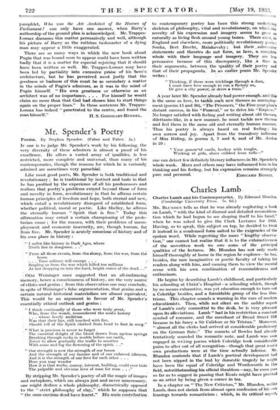Mr. Spender's Poetry
Poems. By Stephen Spender. (Faber and Faber. 5s.)
IF one is to judge Mr. Spender's work by his following, the very diversity of these admirers is almost a proof of his excellence. He offers a varied array of -qualities, is less restricted, more complete and universal, than many of his contemporaries, though the reasons for which he is variously, admired are sometimes very parochial.
Like most good poets, Mr. Spender is both traditional and revolutionary ; he is traditional by instinct and taste in that he has profited by the experience of all his predecessors and realizes that poetry's problems extend beyond those of form and novelty in form, revolutionary in that he affirms certain human principles of freedom and hope, both eternal and new, which entail a revolutionary disregard of established form; -Whether political, moral or poetic. Like Shelley, he affirms the eternally human " Spirit that is free." Today this affirmation may entail a certain championing of the prole: tarian cause ; for the masses, with their problems of unem-, ployment and economic insecurity, are, though human, fa frond free. Mr. Spender is acutely conscious of history and of his own place in history : " I suffer like history in Dark Ages, where
• Truth lies in dungeons. ."
' " From all these events, from theslump, from the war, from the • boom • . . . Time solitary will emerge . . . Singling us from the war which killed ten millions At last dropping us into the hard, bright crater of the dead.. ."
Otto Weininger once suggested that an all-embracing Memory, hence a consciousness of history, are the very source of ethics and genius ; from this observation one may conclude, in-spite of Weininger's false argumentation, that genius and a certain natural historical materialism are almost equivalent: This would be an argument in favour of Mr. Spender's essentially ethical outlook and genius :
" I think continually of those who were truly great,
Who, from the womb, remembered the soul's history • . . whose lovely ambition Was that their lips, still touched with fire, 1 •Should tell of the Spirit clothed from head to foot in song."
" What is precious is never to forget The essential delight of the blood drawn from ageless springs Breaking through rocks in worlds before our earth, Never to allow gradually the traffic to smother With noise and fog the flowering of the spirit. . ."
" Our strength is now the strength of our bones And the strength of our famine and of our enforced idleness, And it is the strength of our love for each other . .
Here you may wonder How it is that works, money, interest, building, could over hide The palpable and obvious love of man for man .."
By stripping Mr. Spender's poetry of all the magic of images and metaphors, which are always just and never unnecessary, one might deduce a whole philosophy, diametrically opposed to the " strict philosophy of clay," which he supposes that " the once-envious dead have learnt." His main contribution
to contemporary poetry has been this strong underlying skeleton of philosophy, vital and revolutionary, on which the novelty of his expression and imagery seems to grow se naturally as living flesh around young bones. There exist, in England and elsewhere, more politically revolutionary poets. Sonka, Bert Brecht, Malakovsky ; but their „subversive statements and theories do not form, as here, a complete whole with their language and imagery. They are less persuasive because of this discrepancy, like _a flaw in their arguments, between the quality_ of _their poetry and that of their propaganda. -qIn an earlier poem Mr. Spender writes : " Thinking, if these were tricklings through a dam, I must have love enough to rim a tgetory on, Or give a city power; or .drive a train." • A year later Mr. Spender already had power enough, and this is the same as love, to tickle such new themes as unemploy- ment (poems 15 and 30), "The Prisoners, " the Five-year plan's distant success, in his "Funeral," or to drive his "Express." No longer satisfied with feeling and writing about old themes, dilettante-like, in a new manner, he must tackle new themes and feel them in the same old and eternally human manner. Thus his poetry is always based on real feeling ; his own sorrow and joy. Apart from the transitory influence of Miss Riding, in .poems 5, 7 and 8, -and of Mr. Auden in 29 :
" Your games'tof cards, hockey with toughs, Winking at girls, shoes cribbed from toffs—" one can detect few definitely literary influences in Mr. Spender's whole work. Marx and others may have influenced him in his thinking and his feeling, but his expression remains strangely
pure and personal.
EDOUARD Room.














































 Previous page
Previous page